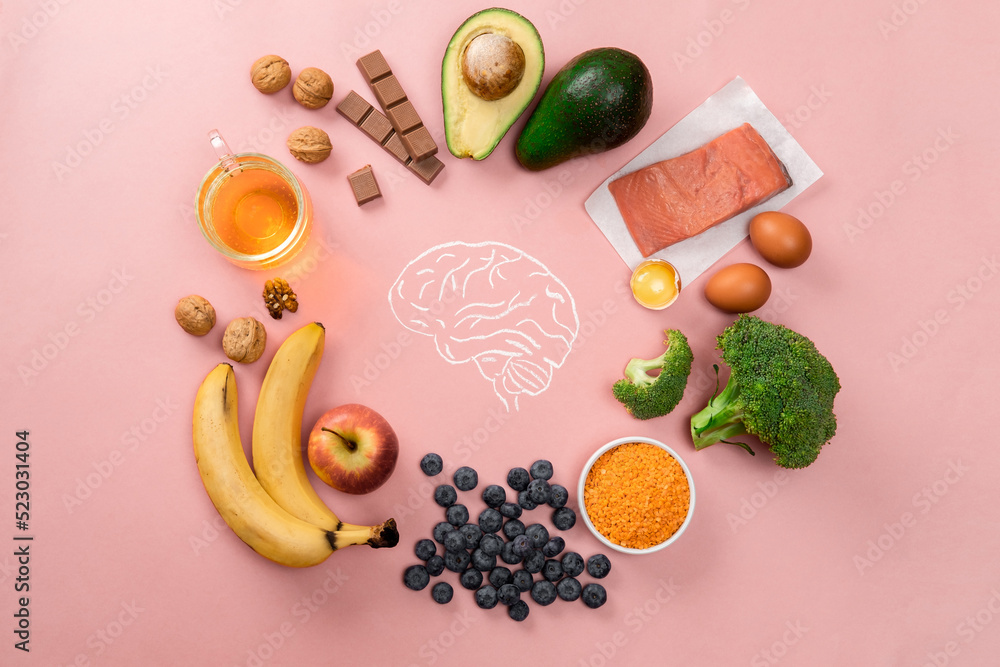Brain Health
Our brains are remarkable organs that require proper nourishment to function at their best. Just as a well-balanced diet supports overall physical health, specific vitamins and minerals play a crucial role in maintaining brain health and cognitive function. In this blog post, we will explore the essential nutrients that act as brain boosters and the foods that are rich in these vital elements.
- Omega-3 Fatty Acids (DHA): Omega-3 fatty acids, particularly docosahexaenoic acid (DHA), are fundamental components of brain cell membranes. They support communication between brain cells and contribute to overall brain function. Research has linked higher DHA intake to improved cognitive performance and a reduced risk of cognitive decline. Fatty fish like salmon, trout, and mackerel are excellent sources of DHA. For vegetarian options, consider including flaxseeds, chia seeds, and walnuts in your diet.
- B vitamins, a group of water-soluble vitamins, are vital for brain health due to their involvement in energy production and the synthesis of neurotransmitters. Among the key B vitamins, Vitamin B6 is crucial for neurotransmitter production and plays a role in regulating mood and cognitive function. Foods like chickpeas, salmon, chicken, and bananas are excellent sources of Vitamin B6. Vitamin B9, also known as folate, plays a significant role in brain development and function. Its deficiency has been linked to cognitive impairments. Rich sources of folate include leafy greens, lentils, and fortified grains.Vitamin B12 is critical for maintaining healthy nerve cells and supporting cognitive function. It is predominantly found in animal products like meat, fish, eggs, and dairy. Vegans can obtain Vitamin B12 from fortified plant-based foods or supplements.
- Antioxidant Vitamins: Antioxidant vitamins, such as vitamin C and vitamin E, protect the brain from oxidative stress and inflammation, which can contribute to cognitive decline. Foods rich in these antioxidants include:a) Vitamin C: Abundant in citrus fruits (oranges, grapefruits), strawberries, bell peppers, and broccoli.b) Vitamin E: Found in nuts (almonds, hazelnuts), seeds (sunflower seeds), spinach, and avocado.
- Vitamin D: Vitamin D is essential for brain health, and its deficiency has been associated with cognitive impairment and an increased risk of neurodegenerative diseases. Exposure to sunlight is the primary source of vitamin D, but it can also be found in fatty fish, fortified dairy products, and supplements if needed.
- Magnesium: Magnesium is a mineral that plays a significant role in cognitive function and mood regulation. It is involved in hundreds of biochemical reactions in the brain. Leafy greens, nuts, seeds, whole grains, and legumes are excellent sources of magnesium.
- Zinc: Zinc is involved in neurotransmitter function and plays a role in learning and memory. Foods rich in zinc include oysters, beef, poultry, beans, and fortified cereals.
- Iron: Iron is essential for oxygen transport in the blood, including the brain. A deficiency in iron can lead to cognitive impairments and fatigue. Good sources of iron include red meat, poultry, fish, beans, and fortified grains.
- Choline: Choline is a precursor to the neurotransmitter acetylcholine, which is crucial for memory and learning. Eggs, liver, and soybeans are excellent sources of choline.
- Curcumin: Curcumin is a natural compound found in turmeric and has potent anti-inflammatory and antioxidant properties. It may help protect the brain from age-related cognitive decline and neurodegenerative diseases. Consider adding turmeric to your curries, smoothies, or soups to benefit from curcumin’s brain-boosting effects.
- Flavonoids: Flavonoids are a group of plant compounds with antioxidant and anti-inflammatory properties. They have been shown to enhance cognitive function and memory. Foods rich in flavonoids include berries (blueberries, strawberries), cocoa, tea, and citrus fruits.
In conclusion, proper nutrition plays a pivotal role in maintaining brain health and cognitive function. The key vitamins and minerals mentioned above are essential for supporting brain health. This includes protecting against oxidative stress and inflammation, and promoting optimal cognitive performance. A well-rounded diet that includes a variety of nutrient-dense foods can provide the necessary elements to nourish your brain and keep it sharp throughout life. So, let’s make conscious food choices and prioritize brain health for a fulfilling and vibrant future.
How useful was this post?
Click on a star to rate it!
Average rating / 5. Vote count:
No votes so far! Be the first to rate this post.






